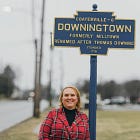On Trans Day of Remembrance, Bethany's Life is at the Center of My Mind
Hope Pisoni | Uncloseted Media Weekly Newsletter
On Nov. 25, 2024, Bethany Hine was found dead in New York City’s West Village. Bethany, a trans woman who had been unhoused for over six years, was a personal friend.
I met Bethany a few months after I moved to the city in 2021 at a mutual aid event in Washington Square Park (WSP). She was such a sweetheart—not in the performative, fake smiles and empty platitudes way. But in that rare, special way that shows warmth for the people around her. She was one of the only people I knew who would respond with sincerity to a “how are you?”, which made the little moments of joy all the sweeter. I met her first while I was still presenting male, and despite not being super close with her at the time, she was so supportive of me when I started my transition.
She was one of the first people to call me pretty, to tell me I was beautiful—and she made sure I didn’t forget it whenever I saw her. I was, of course, deeply insecure, but coming from her, I couldn’t help but believe it.
Bethany had a knack for getting herself in strange, humorous situations. I remember helping her lug an audio system that had been thrown out by some wealthy Village resident in a stray shopping cart.
She was also quite the luddite. In Dec. 2019, she was interviewed for the New York City Trans Oral History Project where she talked about being as unplugged as possible: no email, no social media, no phone calls when she could avoid it. She called technology “the downfall of communication between people and society.”
She did love all types of music—except Christmas music, that is. She used to love going to concerts, and when she couldn’t afford it, she’d hang around WSP to enjoy the tunes of the famous piano man or the many jazz bands. She also made friends with the neighborhood dogs and when she was younger had studied to be a veterinarian.
Bethany meant a lot to me—more than I realized before she passed. The love and kindness she showed me, especially in the pivotal early months of my transition, have stuck with me.
To me, she was a kind soul and a cornerstone of the community and hearing she had passed was a gut punch that still hasn’t sunk in. But to countless New Yorkers, she was just part of the background.
The West Village was the site of the 1969 Stonewall Riots, a pivotal moment in LGBTQ history spearheaded by poor and unhoused queer people. Today, homelessness remains a trans issue. A 2020 study found that 8.3% of trans adults in the U.S. had experienced homelessness in the past 12 months, and a 2021 study found that 38% of trans women and aged 18-25 have experienced some form of housing instability or homelessness.
Today, the West Village is one of the wealthiest neighborhoods in the city. Most of its residents bear little resemblance to Bethany, who grew up in a poor and abusive household and was abandoned by most of her family over her gender identity, leaving her little safety net when she got addicted to painkillers that she was prescribed after a car accident. After ending up on the streets, she was routinely ignored, or worse, by the neighborhood’s residents.
In 2022, Brian Maloney, a member of a local block association, spoke with The Village Sun about hiring security officers to kick unhoused people out of their block. He told the Sun that he tried to use one instance where he walked past an unconscious Bethany as “a teachable moment for his daughter.” Elsewhere, he made transphobic comments about her:
“As for Bethany, the transgender, Maloney said she has been visibly sinking and, as a result, is ‘losing her trans.’”
The article infuriates me because it captures how trans people on the streets are seen by so many wealthy people, and how the end result of this disregard is—in some cases—state efforts to make people like Bethany disappear.
But Bethany wasn’t afraid to push back. Last October, she became a plaintiff in a lawsuit that argues that the city’s policy of “homeless sweeps”—which force unhoused New Yorkers to pack up and move their belongings or risk having them removed or destroyed—violates their constitutional rights.
According to the ongoing lawsuit, Bethany was swept at least 29 times in one year. On one occasion, police gave her less than five minutes to pack up and move her belongings. On others, they swept her belongings in the pouring rain or while she wasn’t even present. The city destroyed her clothes, jewelry, laptop, IDs, a deceased friend’s jacket and even her hormone medications.
Police departments destroying gender-affirming medications and news organizations making invasive comments about a trans woman’s body should spark wide outcry. But because Bethany was unhoused, her personhood was disregarded.
Many LGBTQ advocates often stay out of housing justice, but attacks on unhoused people are attacks on trans people—and like other attacks on trans rights, they are on the rise.
What truly amazes me is that, even as so many were so cruel to her, Bethany did everything she could to be kind. She was friendly to as many people as she could be, and whenever she could get her hands on extra food or blankets, like the leftovers from the nearby Dunkin’ Donuts, she would pass what she could along to others.
I want Bethany to be remembered for who she was as a community member, an activist and a good soul. Most importantly, I want to ensure her story is not lost as so many others are.
I’ll leave you with the words she ended her interview with:
“I’m trying to still be kind to people. Even when they’re nasty to me now, I’ve started just praying for them, that something will change in them that will take away that hardness and that heaviness in their heart so that they can be kinder to somebody else. You don’t need to give a homeless person money, just give them the time of day.”
Note: For Bethany’s life story, I recommend listening to this interview to hear it in her own words.
Danielle Smith’s notwithstanding clause triple play on trans youth rights (CBC)
What changed since Alberta trans health, sport and school pronouns laws came in, besides a court injunction?
Trump faces criticism for referring to female Bloomberg reporter as ‘piggy’ (The Guardian)
Critics accuse the US president of trying to ‘shut women journalists up’ with ‘demeaning language.’
LGBTQ+ people are more likely to be stopped, arrested, and falsely accused by police: report (The Advocate)
LGBTQ+ people are more likely to be mistreated by police, and it’s impacting when they’ll call for help.
Gay teen & family sue high school for protecting football players that bullied him daily (LGBTQ Nation)
The high school is facing three federal lawsuits all centered around how football players allegedly got away with violently tormenting their classmates.
Thousands of cisgender women have declared that they stand united against anti-trans rhetoric.
Over the next week, be on the lookout for new Uncloseted reporting:
🆕 A growing number of Americans are walking away from their faith not because they stopped believing in God, but because their churches won’t stop attacking LGBTQ people. On Saturday, Jake Angelo follows one man’s five-year struggle to deconstruct his his Mormon faith and unpacks new data showing a generational shift in how queer exclusion is pushing people out of religion for good.
🆕 Anti-trans laws aren’t just an American problem. Alberta is importing U.S. rhetoric, witnesses, and legal tactics to justify sweeping attacks on LGBTQ rights. From Alabama-inspired bans to a reliance on discredited experts, Emma Paidra maps the cross-border pipeline.
Thanks for reading! Feel free to email me with questions, complaints and story ideas!
Hope Pisoni — Investigative Reporter, Uncloseted Media
If objective, nonpartisan, rigorous, LGBTQ-focused journalism is important to you, please consider making a tax-deductible donation through our fiscal sponsor, Resource Impact, by clicking this button:









That was a beautiful story about Bethany, thanks for sharing some of her life story with us. I'm reading this today 21st November a date that the trumps Homeland Security detail has decided it's not a hate crime to show the swastika or the confederate flag. Yet it is still a hate crime it appears to show the Pride flag. What's wrong with this picture people?